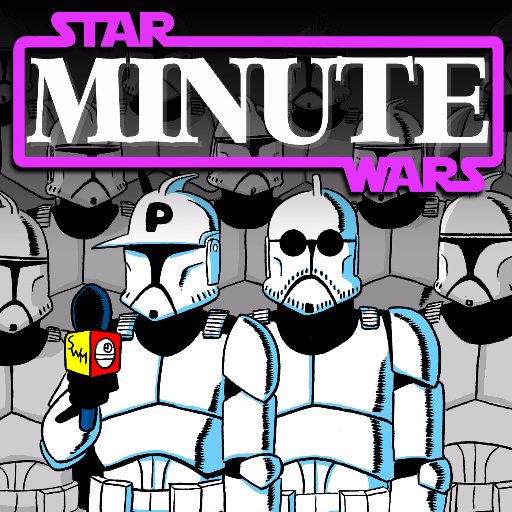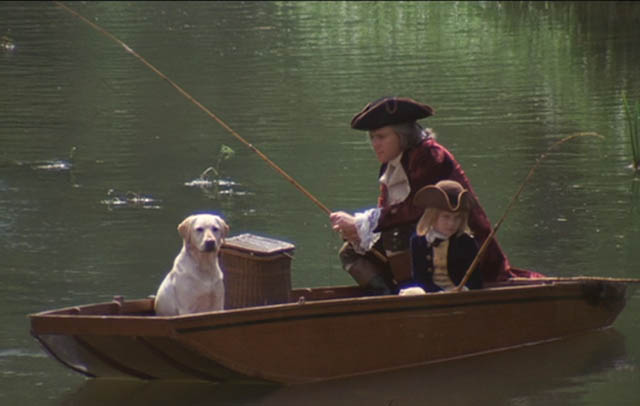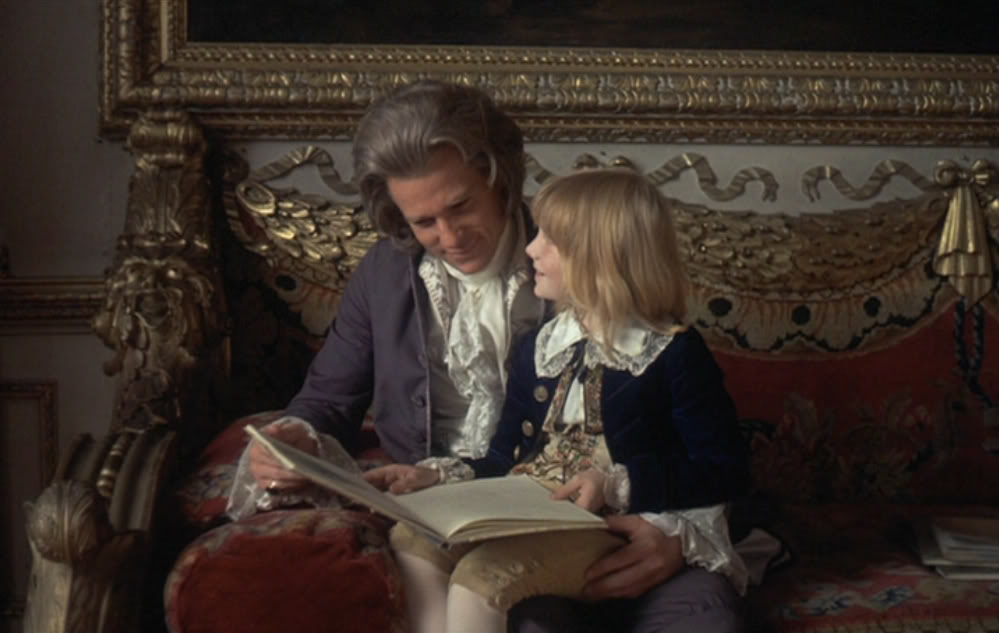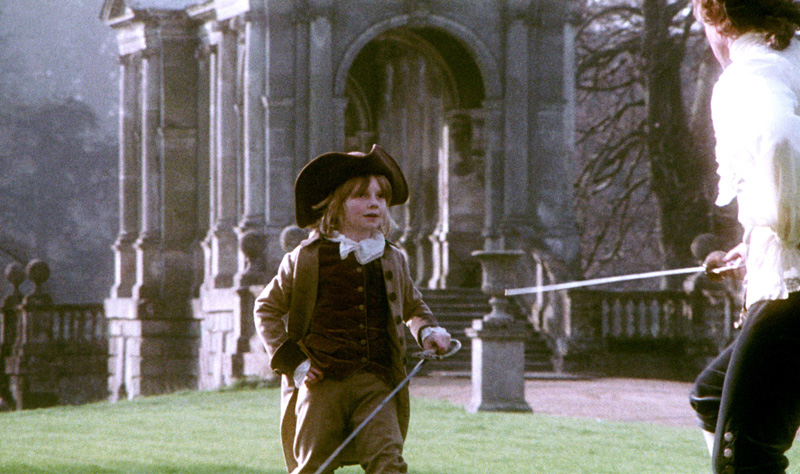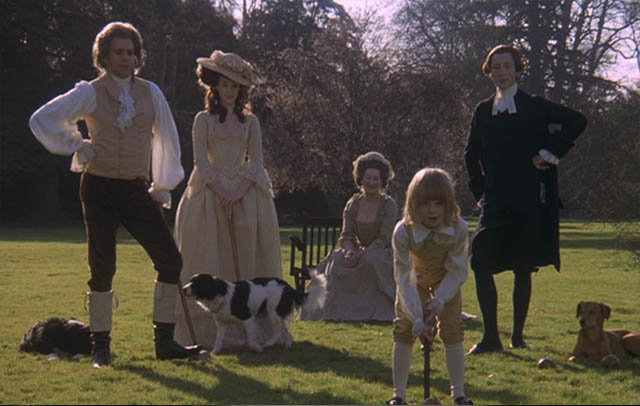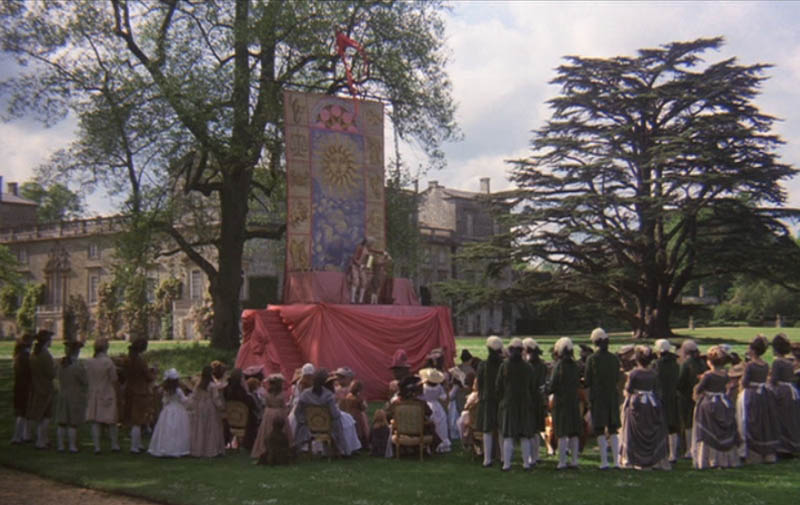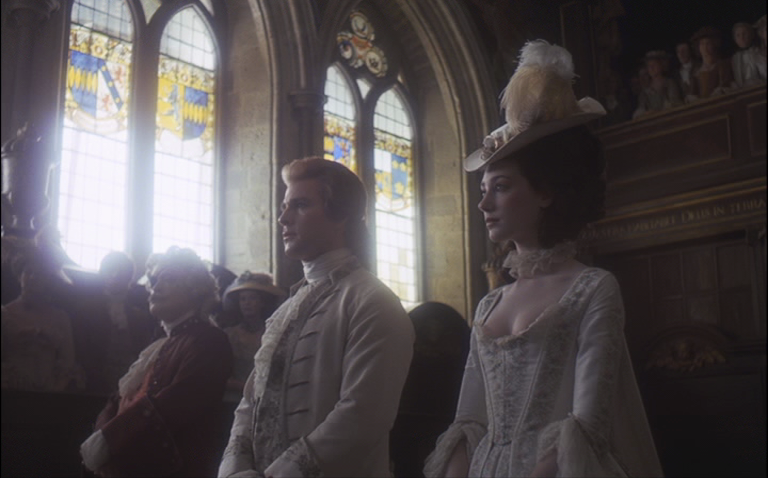Kubrick: Barry Lyndon part 9
Scene 92-96. Barry’s plans for becoming a gentleman have come to nothing. He still lives in a nice house, still has access to money, still has a beautiful wife (who apparently loves him more than he deserves) but he will never be a true gentleman. His violent streak — that is, his tendency to deliver violence on his own terms, rather than through money or an intermediary — has put an end to that dream forever.
Without social advancement, what does he have left? The answer, oddly enough, is “love.” Barry loves his son Bryan with great abandon. We’re treated to the longest “montage” yet in Barry Lyndon — five scenes of Barry interacting with Bryan and being a loving, indulgent father. He fishes with him, reads to him, teaches him how to fence, plays croquet with him, and takes him horseback riding. The narrator deepens the images with background on how Barry feels about the boy, and also spoils their love by announcing that the boy is doomed to die young.
There’s another way to read the montage, of course — Barry wants social advancement, and he threw that chance away when he kidney-punched his stepson in a packed recital hall. So in order to achieve the gentlemanly status he craves, he employs the oldest trick in the book: he chooses to achieve his goal through his progeny. And while that reading is more cynical, it also indicates that Barry, at this stage of his life, has at least begun to think outside himself, to understand life on a more cosmic level, to see himself as part of a continuum.
Kubrick: Barry Lyndon part 8
Scene 75. As Act VIII of Barry Lyndon begins, we’re treated to a rare explicit time jump. Barry’s son Bryan is now 8 years old and is, it appears, a very happy little boy. Lord Bullingdon, meanwhile, has grown from an anxious little boy to an anxious young man, still sitting at his mother’s knee, still holding her hand, now wearing the white makeup and powdered wig of his station as a young lord.
The scene is Bryan’s eighth birthday party, and all of Lady Lyndon’s friends are there, as well as Barry’s mother. Barry, we could say, has arrived. He’s got access to wealth, he’s got wonderful social status, he’s got a beautiful wife whom he treats terribly, he’s got loads of friends and he’s having sex with every lady who meets his gaze.
Appropriately, the scene illustrating this is a magic show. A magician performs routine sleight-of-hand and conjuring tricks for Bryan as the crowd smiles and applauds, and we’re reminded that Barry’s life is a kind of magic trick of its own. Deception, trickery, showmanship and style got Barry where he is, and the deeper suggestion of the narrative is that everyone there at the party, indeed, everyone in the movie, has achieved their social status through some combination of thuggishness, trickery and deceit.
Kubrick: Barry Lyndon part 7
SCENE 63. We come back from intermission to find a title card announcing that the remainder of Barry Lyndon will be about Barry’s fall from good fortune. The first part of the movie — the first six acts — were about Barry’s rise to wealth and power, and the second part will concern his undoing.
That would make Scene 63, which shows the wedding of Barry to Lady Lyndon, dramatically, the pinnacle of Barry’s joy. He’s gone from being a love-sick middle-class goon to being married to a genuine capital-L Lady. He’s been re-born a number of times so far in the movie, but the wedding is the moment where he has finally, he feels, entered into his true domain: a gentleman of wealth and taste.
We see Barry’s allies in attendance at his wedding: the Chevalier de Balibari and his mother are both there lending their support. If Barry’s mother sees anything untoward in her son’s marriage, she doesn’t show it: she, too, seems to feel that she has finally entered her proper sphere at the mother to a gentleman of wealth and taste.
Reverend Runt performs the ceremony, and Kubrick gives special emphasis on the nature of marriage among nobles in 1773. Marriage, says Runt, is what saves humans from acting “in carnal lust, like brute beasts,” and that marriage is something to be entered into “soberly, and in the fear of God.” We can almost see Barry’s smirk — he’s seen enough of life in the Seven Years’ War to know that men are brute beasts, and enough injustice to know there is no God.
Where are our themes now? Runt addresses violence in its absence, Barry has reached the pinnacle of his social climb, and love, we are meant to gather, is nowhere in evidence.
The scene also suggests the question, what does Lady Lyndon want out of this? Does she think Barry is actually a gentleman, or has he merely succeeded in flattering her to the point where she doesn’t care? As the narrative progresses, her son Lord Bullingdon (here seen staring daggers at Barry during the wedding ceremony) routinely accuses Barry of being, well, of being who he is: a base-born Irish social climber. Lady Lyndon’s husband Charles bellowed the same thing, so it’s hard to imagine that the thought never crossed the Lady’s mind. On the other hand, Lady Lyndon is still young, and, based on the evidence, did not have a satisfying sex life with her husband. The narrative does not say, but one wonders how Lady Lyndon ended up married to Charles in the first place. They have an 11-year-old son, so she must have been quite young when she was married off to Sir Charles. Maybe she was traded to Sir Charles by her own father, who was a social climber much like Barry. Maybe she knows, to some extent anyway, who Barry is and what a fraud he is, and accepts him on face value. In any case, suffice to say, the movie does not dig very deep below the surface of Lady Lyndon’s motivations: she remains, almost entirely, a porcelain doll in a gilded case.
